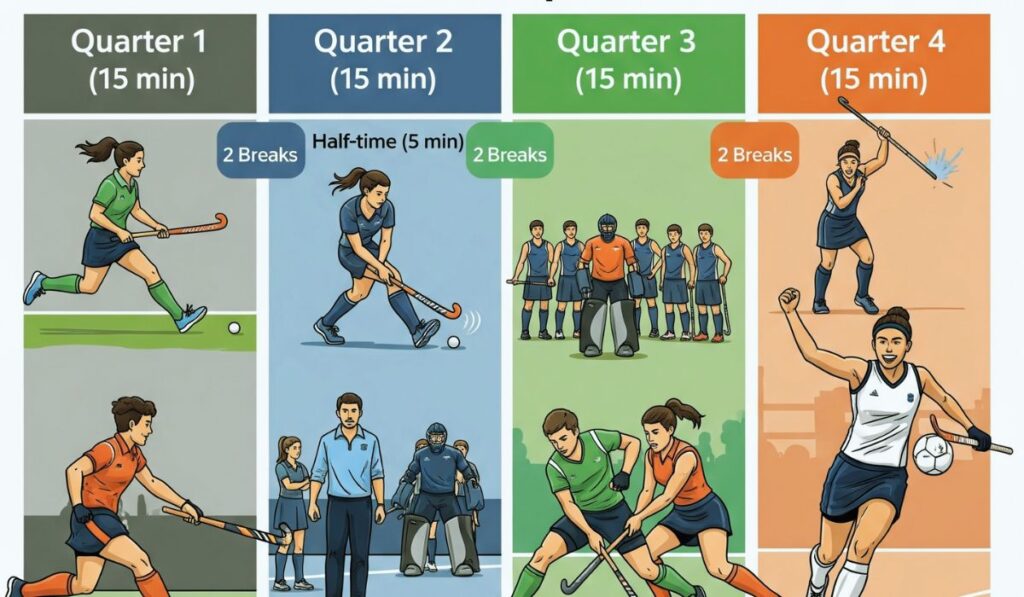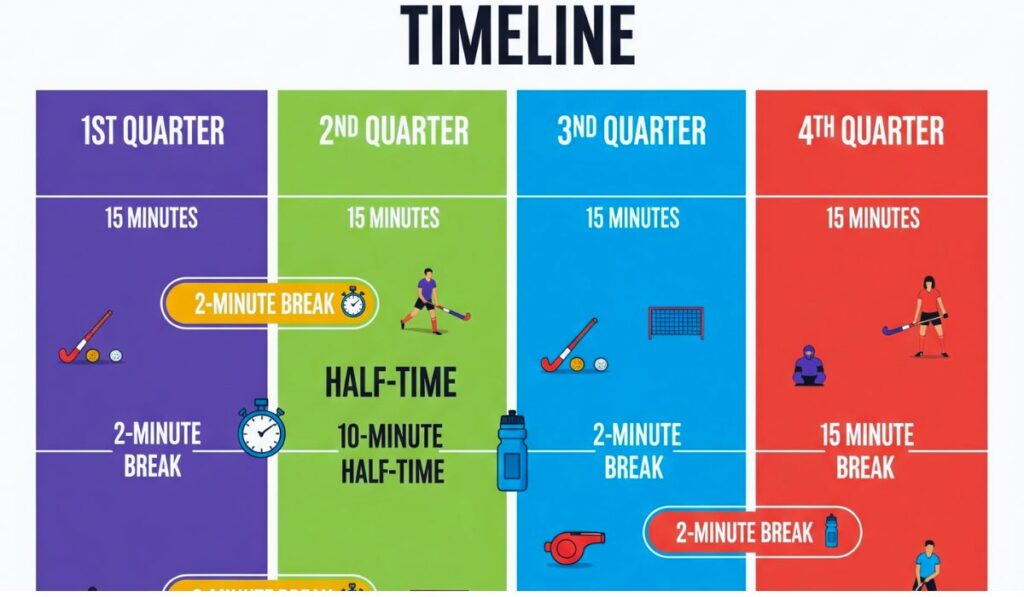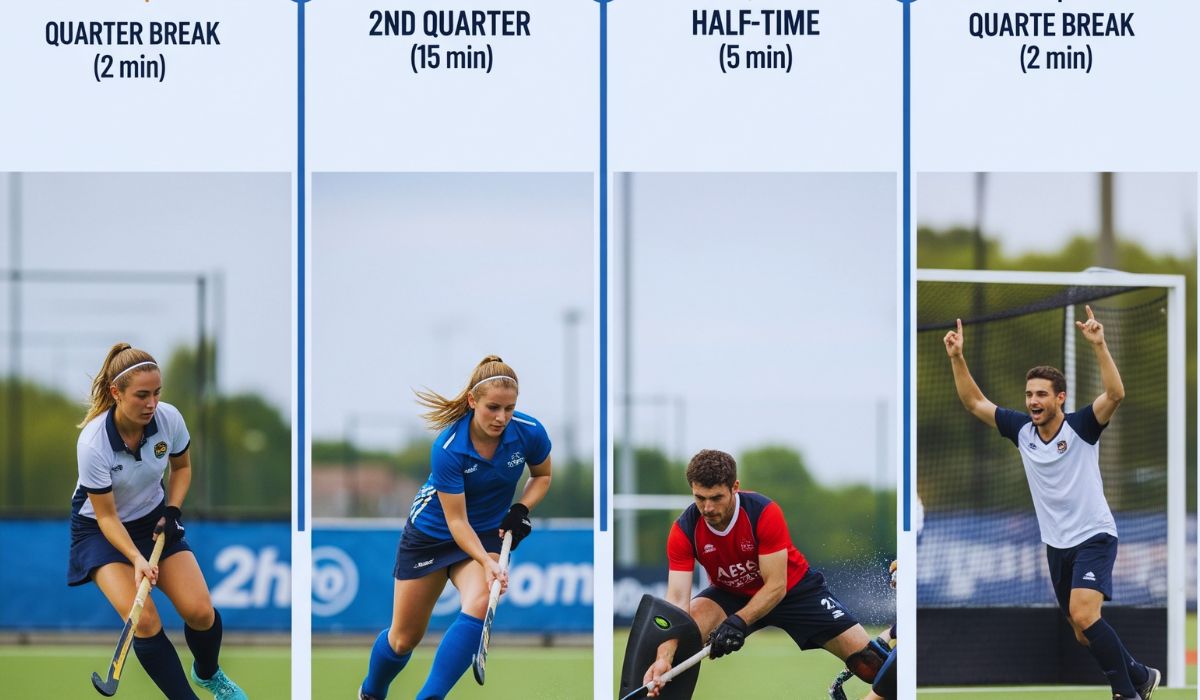In the electrifying world of field hockey, every moment is a battle between ambition and fatigue. But one question persists in the minds of fans and newcomers alike: How long does a hockey match last? It’s more than a measure of time—it’s a journey through intensity, strategy, and legacy.
How Long Does a Hockey Match Really Last in Modern Times?
As of recent regulations, a standard hockey match lasts 60 minutes, divided into four 15-minute quarters. This quarter-based format replaced the previous two-halves structure to improve the sport’s pace and viewer experience. It offers a high-intensity, well-structured flow of play and ensures better stamina management for players.
Why Did Hockey Change to 4 Quarters?
The change came via the International Hockey Federation (FIH) to meet broadcasting demands and enhance tactical gameplay. This 4-quarter format answers the question “how long does a hockey match last?” not just with minutes, but with reasons grounded in evolving audience and player needs.
Total Match Time – Is It Just 60 Minutes?
While the how long does a hockey match last consists of 60 minutes of active play, additional time due to breaks, referrals, and timeouts extends the actual duration to 70–90 minutes. So if you’re asking “How long does a hockey match really last?”, know that your viewing commitment is about an hour and a half.
How Long Does a Hockey Match Really Last Historically?
Before the 2014 rule change, how long does a hockey match last 70 minutes—two halves of 35 minutes. This format gave more continuous playtime but lacked the modern game’s balance of rest and intensity.
What Happened During Breaks?
- 2-minute breaks: After 1st and 3rd quarters
- 10-minute halftime: After the 2nd quarter
These pauses help players recover and coaches deliver quick tactical resets.
How Long Does a Hockey Match Really Last When It Goes to Overtime?
In knockout matches, a tied score leads to overtime, often ending in a shootout. These moments add significant emotional and time pressure, stretching the game even further—sometimes beyond 100 minutes including preparation and celebration.

Golden Goal – A Thing of the Past
Previously, extra time used a golden goal rule, where the first team to score won instantly. While exciting, it’s now mostly replaced by structured shootouts to ensure fairness.
How Long Does a Hockey Match Really Last in Indoor and Youth Variants?
- Indoor Hockey: Two halves of 20 minutes
- Youth Leagues: Vary from 25-minute halves to 10-minute quarters, depending on age group
So, “how long does a hockey match really last?” depends heavily on context—age level, league regulations, and type (indoor or outdoor).
Time Management – A Tactical Advantage
Top teams exploit every second. From strategic delays to quick substitutions, clock management has become an invisible battlefield. Coaches use every timeout and quarter break to influence the game’s flow.
How Time Impacts Player Conditioning
Athletes now train in time-based intervals, simulating each 15-minute quarter. These drills help prepare for fatigue management and performance peaks aligned with each phase of the match.
The Role of Technology in Match Duration
Video referrals, clock stoppages for cards or penalties, and timeouts are all tracked by technical officials. They ensure time is accurately paused and restarted, keeping matches fair and on schedule.
Emotional Connection with Time in Hockey
Beyond the stopwatch, “how long does a hockey match last?” is measured by emotional impact. Fans and players live every second with intensity. One goal in the final 10 seconds can redefine careers
The Countdown Clock – A Thrilling Element
Few things how long does a hockey match last the thrill of watching the final 30 seconds tick down with the game tied or hanging by a goal. Time becomes a character in the drama of hockey.
How Long Does a Hockey Match Really Last for Fans?
For fans, the how long does a hockey match last doesn’t end at the whistle. The build-up, live intensity, and post-game emotion stretch far beyond 60 minutes. A close game can feel like an eternity—or a blink.
Referees and Their Role in Time Perception
Referees influence match rhythm. Fast decisions speed things up, while video reviews or injury breaks can slow the tempo, affecting the total experience.
How Long Does a Hockey Match Really Last During Weather Interruptions?
Rain, lightning, or poor visibility can pause or postpone outdoor matches, stretching time even further. how long does a hockey match last may be delayed for safety or canceled if conditions persist.
Time Isn’t Just Minutes – It’s Legacy
Athletes remember when they scored, missed, or made a critical play. Time becomes a timestamp of legacy, etched forever in their careers and memories.
The Soul of a Hockey Match Lies in Time
The answer to how long does a hockey match last isn’t just factual—it’s emotional. The silent rituals before a game, the heroic moments in the final minutes, and the tears shed afterward all live in those 60 minutes, and far beyond.
When Every Second Feels Like a Lifetime on the Field
There’s something magical about watching a hockey match unfold in real time. Every second seems to stretch when a team is chasing a goal, and every pass carries the weight of thousands of hearts. For players, time isn’t just a countdown—it’s a test of discipline, courage, and vision. So when people ask how long does a hockey match last, the answer isn’t just 60 minutes. It’s a compressed universe where dreams are built, broken, and sometimes reborn in an instant.
The Emotional Build-Up Before the Whistle Blows
Before the clock even starts ticking, players feel time differently. The anticipation in the locker room, the tightening of the jersey straps, the hush before the national anthem—all these moments stretch time in a way that fans rarely experience. These emotional pulses, which begin long before the match starts, are part of the true answer to how long does a hockey match last. It’s not just about what happens on the turf—it’s about what brews in the soul.
The First Quarter: A Rush of Energy and Tension
The first 15-minute quarter is pure adrenaline. It’s where teams test strategies, break into formation, and attempt to seize early control. During these moments, players are hyper-aware of the clock, pushing limits without burning out. To the spectator, it may seem like a brief introduction, but to those on the field, every tick of the clock during that first quarter is a blend of speed and nerves. It’s in this quarter that the tone for the entire game is often set.
The Unspoken Language of Time Between Passes
If you’ve ever stood on the sideline during a match, you’ll realize that players don’t just move with purpose—they move with rhythm. Every pass, sprint, and tackle is timed to a silent beat that only those who live the game understand. This orchestrated chaos is another layer in the question of how long does a hockey match last, because in these brief interactions, hours of training and instinct are condensed into microseconds.
How Substitutions Influence the Clock Emotionally
Substitutions in how long does a hockey match last aren’t just tactical; they’re emotional resets. When a player steps off the pitch, the match doesn’t pause—but their personal clock does. For the athlete, that moment off the field can feel longer than the minutes they played. Coaches understand this dynamic and use it as a tool—to recharge, refocus, and redeploy energy. For fans, each substitution might be unnoticed, but in the psyche of a player, it alters how long the match feels by miles.
The Second Quarter: The Game Finds Its Groove
By the time the second quarter begins, strategies are clearer and players more settled. This is often where we see the first goals, the early fouls, and the formation of pressure patterns. Though it’s another 15 minutes on paper, emotionally this segment of the game feels longer. The stakes rise with every pass, and those watching start leaning forward in their seats. If you ask a coach how long does a hockey match last, they might point to this quarter as the moment when time becomes psychological.
The Mid-Match Break: A Calm Before the Storm
The 10-minute halftime break is short, but it holds monumental importance. It’s a brief but vital time for players to breathe, hydrate, rethink strategies, and feel the collective energy of their team. In these moments, minutes stretch into a quiet storm of preparation. The break doesn’t reset the match clock—but it resets the players’ emotional timelines. That’s why answering how long does a hockey match last needs to include this crucial space of mental and physical regrouping.
How Fans Feel Time Differently
To the crowd, time is a rollercoaster. A lead creates comfort, a deficit sharpens awareness. In close games, fans count every second, often shouting it aloud as if their voices can slow the inevitable. The emotional toll is undeniable. Fans don’t just watch a match—they experience every minute with bated breath. Ask any die-hard supporter how long does a hockey match last, and they’ll tell you: as long as their heartbeat remains unpredictable.
Third Quarter: Momentum or Mayhem
The third quarter is where champions are often made. At this point, fatigue starts setting in, and concentration becomes everything. It’s where the line between control and chaos begins to blur. A team that’s trailing becomes desperate. A team that’s leading grows defensive. Tactically and emotionally, this 15-minute stretch feels heavier than the rest. It’s why many seasoned coaches prepare their strongest plays specifically for this segment.
The Final Quarter: Where Legends Rise
If the rest of the game was a story, the last quarter is its climax. Coaches scream from the sidelines, players dig into the last reserves of their endurance, and fans pray for miracles. This final stretch defines careers. In these last 15 minutes, a single second can alter everything. A comeback can ignite, or a heartbreak can finalize. When asked how long does a hockey match last, some will simply point to these final moments—and say, “Forever.”
The Illusion of the Whistle’s Finality
When the final whistle blows, you’d think the how long does a hockey match last. But that’s rarely the case. For winners, time continues in celebration. For losers, it lingers in regret. The echo of that whistle becomes the beginning of reflection, not closure. This emotional resonance is part of the match’s true length. It lives beyond the clock, in locker rooms, in news highlights, in post-game analysis, and in personal introspection.
Injury Time: The Hidden Minutes That Haunt
Often, we forget about those moments when the game stops for an injured player. These unplanned pauses stretch the match unpredictably. They break rhythm, build tension, and alter momentum. While the stopwatch may freeze, the mental strain intensifies. Teams use this downtime to strategize or catch their breath, but for fans and players alike, these minutes feel like an eternity.
The Clock vs. The Crowd
It’s fascinating how different entities in a match experience time. For the referee, it’s mechanical. For players, it’s strategic. But for the crowd, it’s emotional. When you say how long does a hockey match last, you must acknowledge that the audience’s emotional pulse adds invisible seconds to every tick.
Penalty Corners: Seconds That Feel Like Centuries
Few moments in a match carry more weight than a penalty corner. It may only last a few seconds, but it feels like a lifetime. The setup, the anticipation, the strike—every heartbeat slows. It’s the purest intersection of time and tension. And it happens multiple times in a match, magnifying the emotional duration of those 60 physical minutes.
Shootouts: Time’s Most Intense Test
When how long does a hockey match last go to a shootout, time becomes surreal. Five chances, five moments, five heartbeats. Here, seconds feel like hours, and silence is louder than any cheer. Players walk alone, aim alone, and live with their outcome. These five-minute duels sometimes define the entire 90-minute experience that came before.
Time as a Teacher in Hockey
Time teaches more than any coach can. Young players learn patience, strategy, and maturity by playing under the clock’s gaze. Veterans master the art of timing—when to rush, when to wait. So, when you ask how long does a hockey match last, remember: time isn’t just counted. It’s learned, felt, and respected.
The Lingering Aftermath
The emotional and physical effects of a how long does a hockey match last after it ends. Sore muscles, replayed goals in the mind, conversations with teammates—this is the real residue of time spent on the field. For many players, a game played today lingers in their memory and body for days or even years.

Hockey’s Timeless Impact on Culture
Even when the final whistle is blown and the stadium empties, a legendary match imprints itself on fans and communities. Iconic matches from Olympic games or World Cups are spoken of decades later. So, how long does a hockey match last? Sometimes, the answer is generations.
When Time Doesn’t Matter at All
There are moments in a match where time becomes irrelevant—an incredible save, a last-minute dive, a moment of pure brilliance. In these brief instances, the match suspends time altogether. These are the fragments that live forever in our memory and define the sport’s beauty.
A Match is Measured in More Than Minutes
In the end, the answer to how long does a hockey match last is both simple and deeply complex. On paper, it’s 60 minutes. But in the heart of a fan, the soul of a player, and the echo of history—it lasts far longer. It’s not just a sport. It’s a story written in seconds and remembered for a lifetime.
When the Clock and the Mind Disagree
There are games where the official time reads only a few minutes passed, yet mentally, it feels like an entire hour has gone by. This psychological dilation of time is common in high-stakes hockey. When your team is defending a narrow lead, or you’re inches away from equalizing, your brain stops trusting the clock. Every second becomes magnified, and anticipation breeds emotional exhaustion. In such moments, fans and players alike begin to truly feel the stretch of time. This is yet another dimension to the question: how long does a hockey match last? Because when stress and passion get involved, the answer lies more in the heart than on a stopwatch.
The Hidden Story Behind Every Timeout
While timeouts in field hockey are rare, they exist in specific formats like indoor hockey or under certain league regulations. These short interruptions are loaded with significance. For the coach, it’s a moment to inject belief. For the players, it’s a pause to reframe the chaos. These 30-second or one-minute breaks are never truly “short.” They carry decades of experience, trust, and dreams, condensed into a few words shouted over the roar of a crowd. The impact of a good timeout can outlast the match itself, influencing outcomes that rewrite history.
How Preparation Alters Time Perception
Ask any elite player, and they’ll tell you that match day begins long before the stadium gates open. The ritual starts in the morning: hydration, mental visualization, stretching, tape work, strategy reviews. Hours pass in preparation, but it all funnels into that 60-minute sprint on the field. For these athletes, how long does a hockey match last is tied as much to the emotional effort before the game as it is to the performance during it. What the crowd sees in one hour is the result of countless quiet hours no one will ever witness.
Extra Time: The Most Gripping Minutes in Hockey
In some formats like knock-out tournaments or finals, if the scores are tied at the end of regulation, the game spills into extra time—typically 7.5 minutes per half in some older rules, or a golden goal format in others. These moments are the purest test of nerves, stamina, and willpower. In extra time, players forget fatigue and dive into reserves of courage. Coaches sharpen their focus, and fans hold their breath. Time feels slippery—both accelerated and frozen. It’s here that heroes are born, and heartbreaks etched. So again, how long does a hockey match last becomes a moving target, always bending to context.
In the End, the Match Lives Forever
When the lights go out in the stadium and the turf is left empty, the match may have officially ended—but the story doesn’t. It lives on in photographs, news stories, WhatsApp debates, and childhood memories. A match becomes part of a fan’s identity, part of a nation’s pride. Whether it’s the Olympic final or a local inter-school game, its emotional weight never truly expires. That’s why how long does a hockey match last is not a question of numbers—but of legacy.


3 thoughts on “How long does a hockey match last”